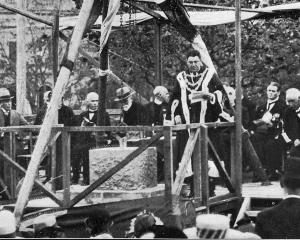A great deal of florid denunciation of the press was heard from irresponsible orators during the occurrence of the strike last year, and only the other day a violent attack upon the press of Wellington was delivered from the dock in the Supreme Court in that city.
It is scarcely likely that any large section of the public attaches a great deal of weight to the criticism which has been directed against the journalism of the country by the persons who have endeavoured to create the impression that it is a venal institution.
There may, however, be some few more or less ignorant and highly credulous people who have attached to the utterances of these individuals an importance that they should not bear. The press has generally in the past treated the attacks that have been made upon it as beneath contempt, but the most recent onslaught upon it renders it desirable, perhaps, that something should be said in refutation of the pernicious rubbish which has been spoken regarding it.
The suggestion that the daily newspapers of the dominion deliberately falsify their reports of events would, if it were well founded, make them unworthy of the public confidence. But it is not well founded.
The judgement of a newspaper may be seriously at fault. The opinion it expresses upon a subject may be wholly unsound. It may regard a question from a mistaken standpoint. All that may be admitted. This is, however, beside the mark.
The complaint is not that the press does not efficiently discharge its function as a conductor of public opinion. The views it expresses are its own. The public need not adopt them unless it chooses.
Each individual reader will form his own estimate of the value of the judgement formed by a paper on any point. He will accept it or reject it according as his own intelligence dictates.
But he is dependent upon the press for a correct statement of the facts upon which the judgement is based. The public is entitled to expect that reports shall be substantially accurate and that they shall not be coloured.
The members of the staff of a newspaper, being human, are liable to err, and there may be occasions upon which the reports of a meeting or of a speech may, as the results of the necessary condensation, fail to convey an entirely adequate presentation of the facts.
But in such an event the newspaper is invariably ready to repair the defect by the admission of correspondence that is designed to clear up any false impression that may have been created.
There is no daily newspaper in the dominion, however, that would wilfully furnish its readers with a garbled report of any speech.
There is none of them that does not so highly value its own reputation and that is so unmindful of the traditions of the best British journalism as to be guilty of such a thing.
It is only the disordered imaginations of soured people that conjure up in a British community the image of a press so lost to a sense of its responsibility as deliberately to supply its readers with inaccurate and unfair reports of public events and speeches.
- Fishing in the Kakanui River on Tuesday evening of last week (the Oamaru Mail states) Mr David Gibson, of Waianakarua, landed three trout, the heaviest of which turned the scale at 17 1/4lb.
The big fellow, which was in excellent condition, was caught with ordinary tackle and live bait, and landed without the aid of a gaff.
- ODT, 25.4.1914.












